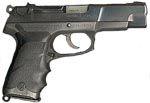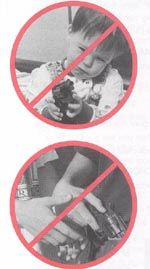Gun Safety

The following information was obtained entirely through the New Hampshire Firearm Safety Coalition.
FIREARM SAFETY IS NO ACCIDENT. IT'S UP TO YOU.

One Story:
A gun, even in a neighbor's home, can lead to tragedy. That's how thirteen year old Tim was killed.
Tim's family did not own guns, and Tim had never been close to one. Twelve year old Jeff was home alone when Tim came over. Because he had gone shooting with his dad, Jeff believed he could show Tim a few things. He took a semi-automatic handgun from his father's closet, loaded it, and showed Tim how to eject the cartridges.
Jeff didn't know that one round remained in the chamber or that the gun could fire with the magazine removed. He didn't know that the safety device was broken. He didn't know how easily the gun would discharge that last bullet. He certainly didn't know that he would kill Tim.
The most important rule of gun handling is NEVER point it at yourself or others. Maybe he didn't know!
Did You Know:
- 12 New Hampshire young people (0-19 years) die from gun shots in an average year.
- The firearm suicide rate for NH teens rose 153% in the 1980's.
Safety and Kids
From the day that our children are born, we work to keep them safe. Curiosity and energy "naturally" put them at risk. We use car seats, locked cabinets, etc., to protect them. We also teach them ways to keep themselves safe. As kids grow, the risks change. The way to prevent injuries must also change. Firearms, with their potential for injury and death, must be approached in the same common sense manner.
Suggestions for Keeping Guns Safely
- Keep guns unloaded and store ammunition separately whenever possible.
- Use a "lock box" for safe storage if you choose to keep your guns loaded.
- Lock up firearms. - Keep keys concealed.
- NEVER install a trigger lock onto a loaded gun since the gun can fire when the trigger lock is moved. Be certain that the manufacturer recommends their use for its guns (e.g. trigger locks should not be used with lever action rifles.
- For group storage, use locking cables (again, be sure all guns are unloaded!) or gun safes.
Teaching Kids
Half of U.S. homes have guns. So, you should talk with your children about firearms, whether or not you have any in your home. All children need to know that guns are not "toys" and they can kill or hurt kids for real.
Small Children
should not be handling guns. Teach them, if they do find a gun:
- Do not touch
- Leave the area
- Tell an adult immediately
- Repeat this message often, especially when you see guns on TV or toy guns in your child's play.
School-Age Children
may be very curious about guns, so:
- Store firearms safely.
- Remind them that guns and the damage they do are real.
- Shoot a melon or sealed plastic jug of water to demonstrate.
- Never leave a child unsupervised with a gun.
- Teach children to handle guns safely.
- Always handle guns safely yourself.
Teen Cautions
TEENS are still learning that real life is different from TV, video games and movies. They often act without thinking things through. Among NH male teens, firearms are used nine times more often in suicides than in homicides.
HELP KEEP OUR YOUNG PEOPLE SAFE.
- Stress the need to solve problems without violence.
- Store firearms safely.
Look for signs of trouble:
- Drug or alcohol use
- Violent actions
- Marked personality change
- Loss of interest in friends, appearance or unusual pleasures
- Decline in school performance
- Increase in risky behavior
- Any verbal hints of suicide
Seek outside help if these or other signs cause you concern. To prevent potential suicides, temporarily remove all guns from your home. If you must keep firearms, secure them to avoid impulsive acts.
If a youth shows avid interest in shooting sports, he or she should complete a firearms education and training program for everyone's safety.
For further information about firearm safety, contact:
Injury Prevention Center at 650-1780
or Gun Owners of NH at 225-4664 / email: http://www.gonh.org

